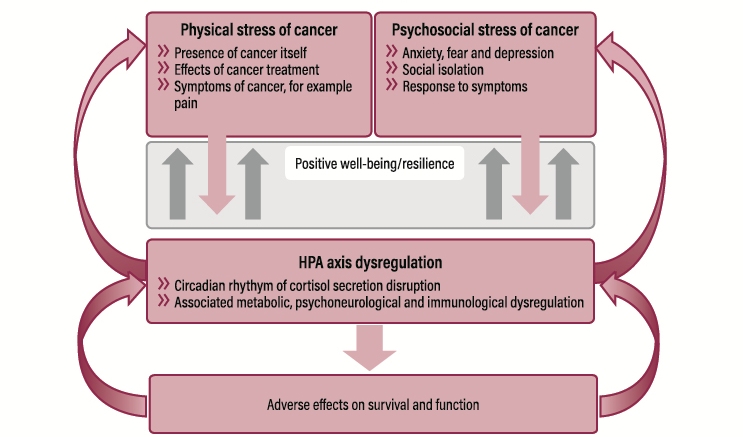Life may not come with a given map, but everyone will experience twists and turns, from everyday challenges to traumatic events which can have lasting impacts like the death of a loved one, a life-altering accident, or a serious illness. Each change affects people differently, bringing a unique chain of thoughts, strong emotions, and uncertainty. Yet people generally adapt well over time to life-changing and stressful situations mainly due to resilience. The body and mind are battlefields. The human body and brain are designed to bounce back from injury. Part of that robustness comes from the fact that the cells in our bodies have outstanding adaptation programming and they can repair and reconstitute tissue and organ function even after near fatal damage.
In context with cancer patients, this group of illness affects more than 14 million people a year, making it one of the leading causes of morbidity and the second biggest cause of mortality worldwide. Many studies have found a higher prevalence of mental illness in cancer patients (statistically 31%), which is higher than the prevalence of mental illness in the general population of US (26.2%), UK (16%), Germany (20%). Not surprisingly, given the chronic stress that often accompanies a diagnosis of cancer, many studies have also documented a high prevalence of anxiety disorders in cancer patients. This is followed by the manifestation of post-traumatic stress disorder (PTSD), another negative externality of cancer. The negative consequences of cancer due to both physical and mental illness can be reduced by certain health-promoting resilience factors. HPA(Hypothalamus Pituitary Adrenal) axis plays an important role in internal stress management in the body and building resilience. Over the last few decades, increasing evidences have been published which state that serious life-altering events and life-threatening illnesses can lead not only to increased psychological distress but also to positive life changes.
Resilience can be viewed as an individual’s ability to maintain or restore stable psychological and physical well being when confronting stressful or adverse events in life. Resilience refers to the individual’s protective attributes or personal characteristics that promote successful dealing with cancer. Those attributes are optimism, self-esteem, self-efficacy, spirituality, mastery, positive emotions, cognitive flexibility, coping among others. Decades of research have demonstrated that higher levels of optimism are associated with positive outcomes in many domains, including physical health.
Certain factors might make some individuals more resilient than others. Resilience is not necessarily a personality trait that only some people possess. It involves behaviors, thoughts, and actions that anyone can learn and develop. Research has shown that resilience is an ordinary trait, not extraordinary which makes its learning simple, given the person has optimism and self-belief. Resilience not only involves “bouncing back” from difficult experiences, it can also involve profound personal growth. Being resilient does not mean that a person will not experience difficulty or distress or become immune to them. It means that they have the strength to grow past the trauma and stress which has been seen in many cancer patients who survive. People who have suffered major adversity or trauma in their lives commonly experience emotional pain and stress. In fact, the road to resilience is likely to involve considerable emotional distress. Optimism, the dispositional tendency to expect more positive outcomes in the future than the negative outcome, and its mastery will certainly help humans to conquer all the adversaries. This is a key to survival among cancer patients. The optimism and resilience will consequently result in personal growth and achieving a plethora of gifts that life serves.
The author is a student member of the Amity Centre of Happiness.





